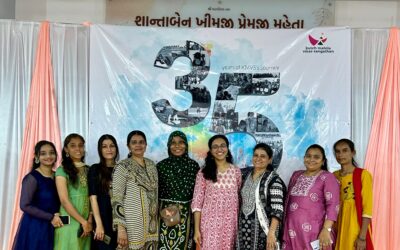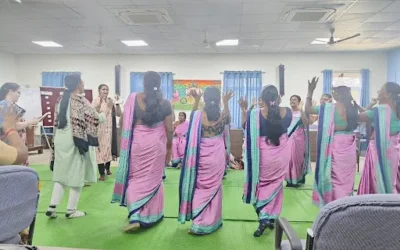Well, it’s not the Golden Globe award-winning song from the movie RRR that I am talking about here. It is my take on India Fellow Social Leadership Program. And how it is Refreshing, Reassuring, and Radiant (RRR) for me.
Happiness, however, is a personal experience, and we can only start sharing and generating happiness for others when we alter the way we view the world
What is happiness and how can we define it?
Ruut Veenhoven is a Dutch sociologist and researcher who has studied the concept of happiness and quality of life. He has identified four key elements that contribute to a good quality of life:
- Material Well-Being: This refers to having enough resources, such as food, clothing, and shelter, to meet basic needs.
- Social Well-Being: This includes having strong relationships and social connections with others. And feeling part of a community, along with having a sense of belonging.
- Personal Development: This refers to personal growth, fulfillment, and achievement, including education, work, and leisure activities.
- Freedom: This includes having control over one’s life. And having the ability to make choices, as well as personal security and freedom from fear and oppression.
The India Fellow Social Leadership Program has had a profound impact on my life. It is helping me to shape my perspective and influencing my overall satisfaction. It is a unique opportunity for individuals to work directly with marginalized communities and to make a meaningful difference in their lives. However, it is important to approach this work with a clear understanding of the goals and objectives. To understand that you prepared to embark on an 18-month transformative journey, delving into the depths of India’s most remote corners to tackle the most pressing social issues of our time?
As you traverse the rugged terrain and navigate the complexities of social change, what treasures do you seek to unearth on your path to becoming a conscious leader? How will this fellowship enrich your journey, and what will you contribute to the tapestry of our collective evolution?
Without this understanding, there is a risk that the program may not have the desired impact on personal happiness and satisfaction. A clear understanding of the purpose and goals of the program is key to unlocking its full potential.
Personally, it allows me to fully engage with the work, to invest myself in the communities that I’m are serving, and to see the positive outcomes that come from the efforts. This understanding also enables me to appreciate the challenges faced by these communities and to work towards addressing these challenges in meaningful ways.




Because of your smile, you make life more beautiful
Thich Nhat Hanh
Being a part of the India Fellow Program has been a fulfilling experience for me. However, the work and responsibilities involved can also be demanding and stressful at times. As a fellow, I keep conscious note of the following, but before jumping into that, let’s talk about unhappiness.
Unhappiness can stem from various factors such as lack of social connections, stress, financial difficulties, health problems, unfulfilling work, low self-esteem, grief, traumatic experiences, personal conflicts, or living in a hostile environment. These causes may vary from person to person and can stem from a combination of multiple factors.
As we discussed earlier the four qualities of life by Ruut Veenhoven, India Fellow helps satisfy the four qualities thereby in the course of time nurturing myself as a socially conscious leader. The most important among them that I would consider is freedom. As a fellow, I have got ground to myself to innovate, experiment, make mistakes and learn from those and make choices that I think are right. This is not available everywhere if you see it. I strongly believe that these are the defining moments where one can reflect upon themselves and see what one is capable of. Now let’s come back to the “things that I consciously keep note of”.
Some suggestions for the reader to keep in mind
- For instance, incorporating mindfulness meditation into their daily routine can help participants manage stress, and improve their focus and concentration. This in turn can positively impact hormones such as cortisol and serotonin that regulate stress and mood.
- Gratitude practices can also play a role in promoting happiness and well-being. By focusing on the positive aspects of life and expressing gratitude, participants can experience an increase in positive emotions. This can lead to enhanced happiness and overall satisfaction with life. It is also beneficial for regulating hormones such as dopamine and oxytocin, which play a role in regulating mood and promoting feelings of happiness and contentment. I usually practice this more and I have benefitted from it.
- Regular exercise has been shown to have numerous benefits for both physical and mental health. By engaging in regular physical activity, participants can improve their mood, increase their energy levels, and enhance cognitive functioning. All of which can positively impact hormones. My constant movement in field areas compensates for this.
- Getting adequate sleep is also crucial for maintaining physical and mental health. By developing good sleep habits, such as avoiding screens before bed and creating a relaxing bedtime routine, participants can improve their mood, increase their energy levels, and reduce stress. This can have a positive impact on hormones such as melatonin, which regulates sleep and wakefulness.
- Finally, building and maintaining positive social connections is important for overall happiness and well-being. By forming strong, supportive relationships with friends, family, and romantic partners, as well as participating in community activities and volunteering, participants can feel fulfilled and happy, and positively impact hormones such as oxytocin and dopamine.
I currently work with underprivileged people in rural southern Rajasthan. As a fellow, I am affiliated with an organisation called Shram Sarathi which primarily concentrates on the financial inclusion of these communities. Working with this community makes me feel personally satisfied and fulfilled. Meeting the needs of those who are underprivileged gives me a sense of purpose and excitement. I am satisfied and fulfilled when I have a good influence on society. And help to build a more just and equal world. I can better understand and appreciate the difficulties these people experience owing to direct interaction and relationship-building. Working with the people, in my belief, may benefit the community as well as my self-contentment and security.
References :
- “The Science of Happiness”
- How to build a happy life – a podcast by The Atlantic




0 Comments